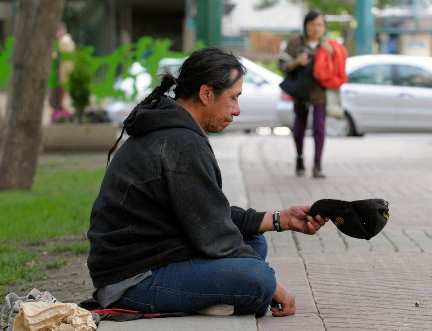In criminal circles, panhandling might be considered one of the least harmful of crimes. Typically seen as nothing more than begging or asking someone for money, panhandling involves people making a conscious decision to hand over their cash to someone they think needs it. Whether or not you think an individual with a sign or a tin cup is okay, there are many states where panhandling is not only not okay, it is illegal.
Kentucky is one state where panhandling has traditionally been against the law. In Kentucky, it is illegal to hold a sign or to ask someone for assistance through coercion, or through eliciting emotion by standing on a street corner or sitting on a sidewalk with some sort of message seeking aid. However, panhandling may become a viable way for people to make money since the Supreme Court has struck down the existing panhandling laws.
A panhandler was recently cited for going against a city ordinance that bans the practice of holding up a sign that asks for help or money. The difference between his citation and many countless others is that he decided to take it to court and fight for his right to free speech. Amazingly, the case made it all the way to the Supreme Court, and he won.
The Supreme Court found that denying the man the right to hold the sign and ask for assistance went against his right of free speech. This overturned an ordinance that has been in existence for decades in Lexington, where local law has prohibited panhandling in intersections and on public streets.
The justices maintained that the ordinance isolated a select group of individuals by singling out only one type of speech. Only begging was prohibited; any other form of speech, such as debate or other opinions was allowed. That means that the only type of speech that was banned was asking for money or begging.
The justices in this case ruled that even if the citizens don’t like it, the First Amendment right to free speech gives everyone from the wealthy to the poor, the same right to voice their opinion in a public place. If they were to deny the beggars from holding up signs, they would be prohibiting the rights that each American is afforded through the Constitution.
A criminal attorney in Aurora will remind you, that if someone is allowed to stand on a street corner or sidewalk and hold up a sign saying “Jesus saves” or “Never Hillary”, then they have to allow another person to hold up a sign that says they need help or money to get through a rough patch. Both are considered the same within the definition of “free speech”. Therefore, you can’t pick and choose who gets to voice their opinion and who doesn’t. That is denying a fundamental American right.
There is no way to determine from the law or the Constitution that “homeless please help” should be a punishable offense any more than any other signs. If you start to decide who can hold and advertise what through signs, then you are leading down a slope of censorship. There are only very limited reasons that the government should step in to curb what someone can and can’t say in public. Those definitions should only include those things that are meant to incite panic or perhaps even harm. Things like not shouting “fire” in a crowded building is one instance where being able to verbalize the phrase could cause harm to the public. Asking for money does nothing to cause public alarm, even if it is annoying and disruptive at times.
According to records, Dennis Champion, who was at the heart of this case, had been issued over 327 various citations for going against the panhandling ordinance in Lexington. The Supreme Court returned the case to a local court to have the citations rescinded and reversed. They also ruled that any charges against him be dismissed.
The law enforcement in Lexington insists that allowing panhandling is disruptive to traffic flow, and therefore hurts the public. But if they are going to use that argument, then they have to ban any form of public discourse or signs, which would be to deny free speech altogether. So for now, panhandling in Kentucky is once again allowed.
